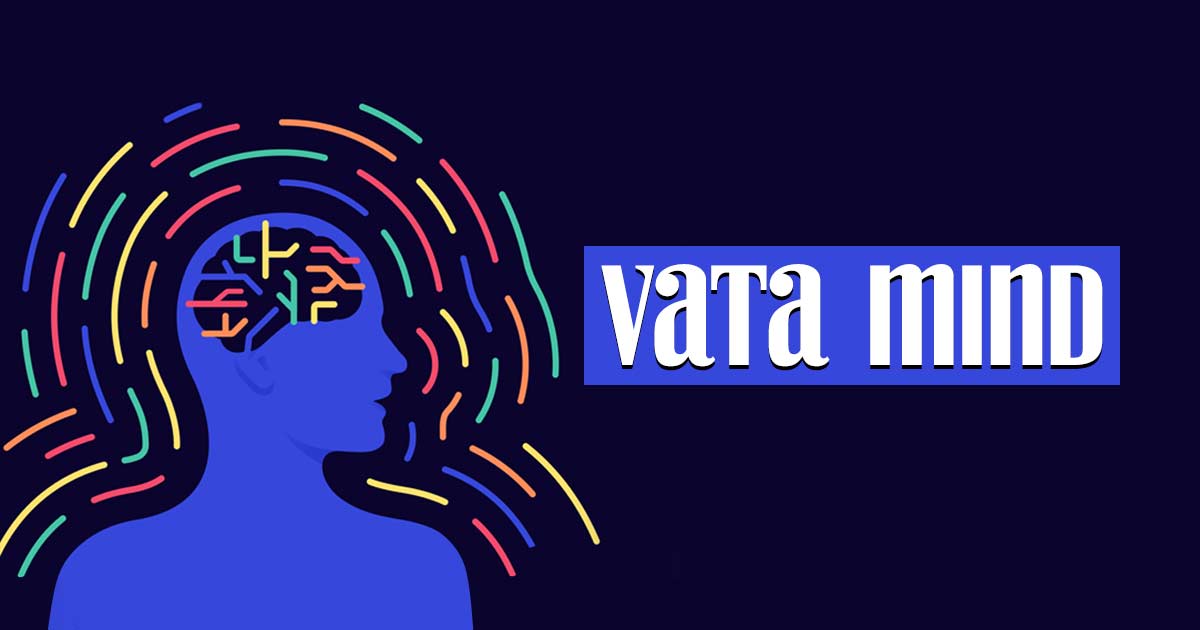In the world of Ayurveda, a holistic system of medicine originating in ancient India, the concept of mind-body balance takes center stage. Ayurveda recognizes distinct mind-body constitutions, or doshas, that influence our physical and mental attributes.
One of these doshas is Vata, associated with the elements of air and space. Understanding the characteristics of a Vata mind and its impact on mental health can provide valuable insights into maintaining a balanced and harmonious state of being.
What Is A Vata Mind?
A Vata mind is characterized by the qualities of its dominant elements, air and space. Just as the wind is quick, changeable, and always in motion, individuals with a Vata mind tend to exhibit these traits in their mental and emotional states.
They are often creative, imaginative, and adaptable, with a tendency to think and speak rapidly. However, when out of balance, a Vata mind can also be prone to anxiety, fear, and restlessness.
Characteristics Of The Vata Mind Type
Vata mind type-dominant individuals possess a range of characteristics that reflect the influence of air and space elements. They tend to have a light build, dry skin, and cold extremities.
In terms of personality, they are often enthusiastic, spontaneous, and curious, with a tendency to start numerous projects but sometimes struggle to see them through to completion. Their creativity and ability to think outside the box make them excellent problem solvers, but their scattered energy can lead to mental exhaustion and overwhelm.
The Vata Mind And Mental Health
A Vata mind type, when balanced, contributes to mental vitality, adaptability, and a zest for life. However, imbalances can manifest as mental health issues. Anxiety, nervousness, and mood swings are common challenges for Vata-dominant individuals.
Their rapid thoughts and constant mental activity can lead to insomnia and difficulty in winding down. Moreover, the airy nature of Vata can cause them to feel ungrounded and disconnected, contributing to feelings of insecurity and fear.
Maintaining Mental Health With A Vata Mind
Ayurveda emphasizes the importance of maintaining balance to promote overall well-being. For those with a Vata mind, this means nurturing practices that counterbalance their inherent qualities. Here are some strategies for maintaining mental health and harmony:
- Routine: Establishing a consistent daily routine can help stabilize the unpredictable nature of Vata. Regular eating, sleeping, and meditation times provide a sense of structure and stability.
- Warmth And Comfort: Vata individuals are sensitive to cold, so staying warm is crucial. warm baths, cozy clothing, and nourishing meals can help maintain their equilibrium.
- Mindfulness: Mindfulness and meditation practices can help quiet the rapid flow of thoughts that characterizes a Vata mind. Focusing on the present moment reduces anxiety and enhances mental clarity.
- Grounding Activities: Engaging in activities that promote grounding, such as yoga, tai chi, or walking in nature, helps Vata individuals feel more connected and centered.
- Nourishing Diet: A diet rich in warm, cooked foods and healthy fats helps pacify the dry and cold qualities of Vata. Herbal teas and warm spices like ginger and cinnamon are particularly beneficial.
- Sensory Soothing: Calming the senses can be helpful for Vata individuals. Aromatherapy, soothing music, and gentle touch provide comfort and relaxation.
- Restful Sleep: Establishing a calming bedtime routine and creating a sleep-conducive environment are essential for managing Vata-related sleep disturbances.
Understanding the Vata mind and its impact on mental health is a valuable insight for both individuals seeking self-awareness and practitioners of holistic well-being. Embracing the qualities of creativity, adaptability, and rapid thinking while addressing the challenges of anxiety and restlessness can lead to a balanced and harmonious state of being.
By incorporating Ayurvedic principles and practices into their lives, those with a Vata mind can navigate the intricate dance of air and space elements within them, nurturing mental health and overall wellness.









